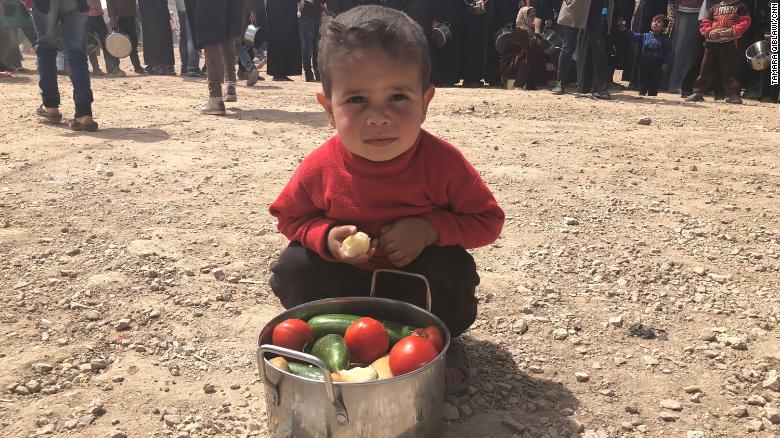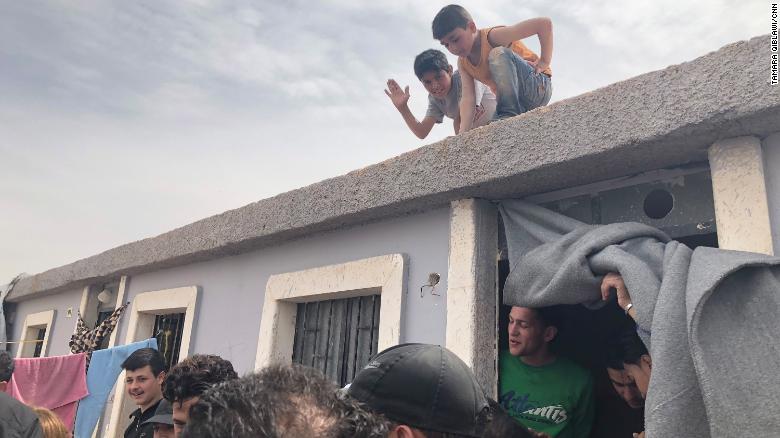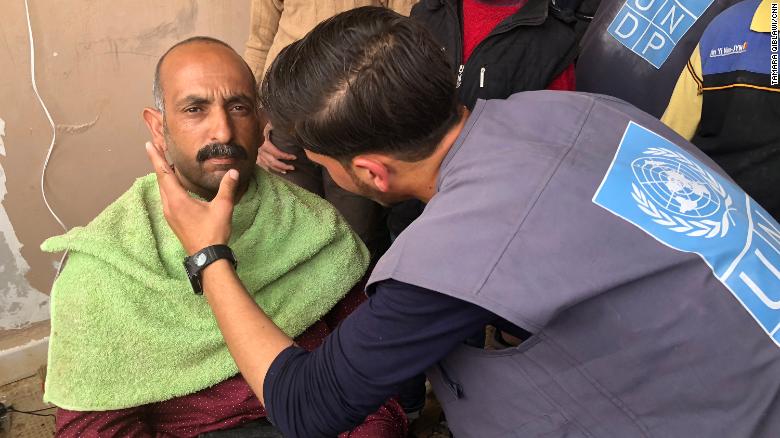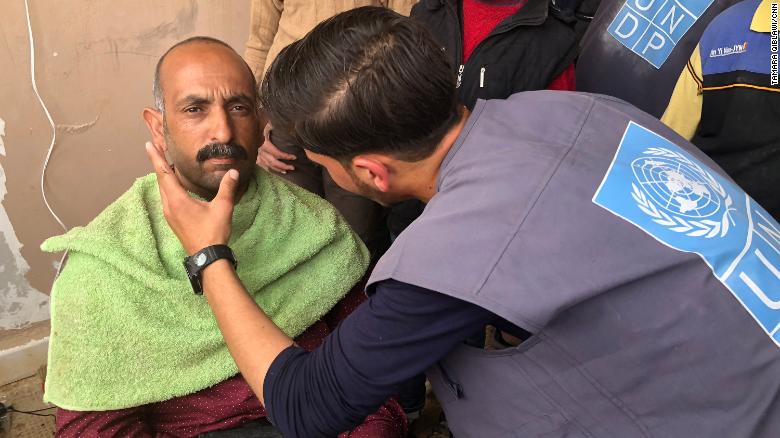Children swap basement hideouts for rooftop playgrounds after escaping war
Damascus, Syria (CNN)Men and boys line up for food outside the kitchen of the Harjala camp for internally displaced persons, some of them wearing cooking pots on their heads for some protection against a scorching sun.
"I used to eat once a day," says 13-year-old Mohammed Abed, recalling his time in formerly besieged Eastern Ghouta.
"Wow, that's great! I only ate once every three days," says 14-year-old Abdullah Jamal.
As they wait for their daily meal -- a pot consisting mainly of potatoes -- the boys compete lightheartedly about who had it worse in the formerly rebel-held enclave.
CNN, which is in the country with the permission of the Syrian government, asked several former inhabitants of Eastern Ghouta how they sustained themselves in previous weeks, when government forces began their final push into the area, tightening the noose of a six-year besiegement. The answer: "Barley."

A boy from Eastern Ghouta shows his family's daily pot of food.
In the government-run Harjala camp, which has already seen about 21,000 civilians from Eastern Ghouta pass through, piles of bread are laid out to dry in the sun because the inhabitants cannot bring themselves to throw any food away. Children play on rooftops -- after weeks of being holed up in basements, they say they want to be as high up as possible.
It's a glimpse into the lives of the nearly 400,000 people who until two weeks ago had been trapped in the Damascus suburb, all but cut off from the outside world.
Around 130,000 people have left Eastern Ghouta in the past month, according to the United Nations. Of these, 83,000 went to eight collective shelters in government-controlled areas on the outskirts of Damascus.
Their movements were restricted and their communications stifled, the camp's residents say.
"We saw everything. We saw the worst things you could possibly imagine," says 12-year-old Mohammed Abed.
The incessant airstrikes over the past month and a half meant many could not risk leaving their basements. Since February 18, more than 1,000 people have been killed in a Russian-backed Syrian government offensive on Eastern Ghouta, which UN Secretary General António Guterres called "hell on earth."
But the rebels, the camp's inhabitants say, were also to blame. Abdel Rahman al Khatib, the chief of the municipality in which the camp is located, is always within earshot of the interviews, and residents appear keen to loudly broadcast their poor opinions of the armed groups opposing the government.
"Six years in Eastern Ghouta was like a really bad film," says Ahmad Shamas, 42.

At Harjala camp, kids play on rooftops after weeks of being holed up in basements in Eastern Ghouta.
They complain that Eastern Ghouta's rebels hoarded food, that anyone who objected to rebel rule risked public decapitation. Some of the displaced say they took up arms and joined the ranks of the rebel groups -- a shocking admission to make from inside a camp where Syrian government forces guard the entrances. The former fighters say they had "little choice" but to join the government's most wanted groups, so they could maximize their family's access to food and secure a paltry income.
None of the three former rebel fighters CNN interviewed admitted to engaging in battle with Syrian government forces.
"We had to do it. There was no other way to survive," says Marwan Khaled, 60. He acknowledges being a former member of Jaish al-Islam, Eastern Ghouta's last remaining rebel group.
He describes the rebel group's leadership as shrouded in mystery.
"We didn't know their names. We weren't allowed to know their names," he says. The leadership comprised several foreigners unknown to the people they ruled over, according to the residents CNN spoke to, and the rebels operated largely from an elaborate underground network.
Syria's official news agency recently showed footage of a "kilometers-long" series of tunnels that government forces say they uncovered in recaptured parts of Eastern Ghouta.
The government's Syrian Arab Army and its allies have recaptured all of the Damascus suburb except for its largest town, Douma, where Jaish al-Islam has been in phased evacuations since Monday.
The fighters and their families are being transferred to Jarablus, a rebel-held city in northern Syria where Turkey provides some administrative support.

A man from Eastern Ghouta has his beard shaven in an open-air barber shop.
Last month, CNN spoke to an official who said she witnessed armed groups preventing a 16-year-old boy from leaving, even though he was slated for medical evacuation.
The Syrian and Russian governments have repeatedly accused rebels of stopping people from exiting Eastern Ghouta and rendering useless a humanitarian corridor ordered by Russian President Vladimir Putin.
Rebels and activists have denied the charges and accused government forces of repeatedly violating a UN-ordered ceasefire.
"The scariest thing were the strikes," says 10-year-old Mohammed Mezze, who fled Eastern Ghouta two weeks ago.
News Courtesy: www.cnn.com











